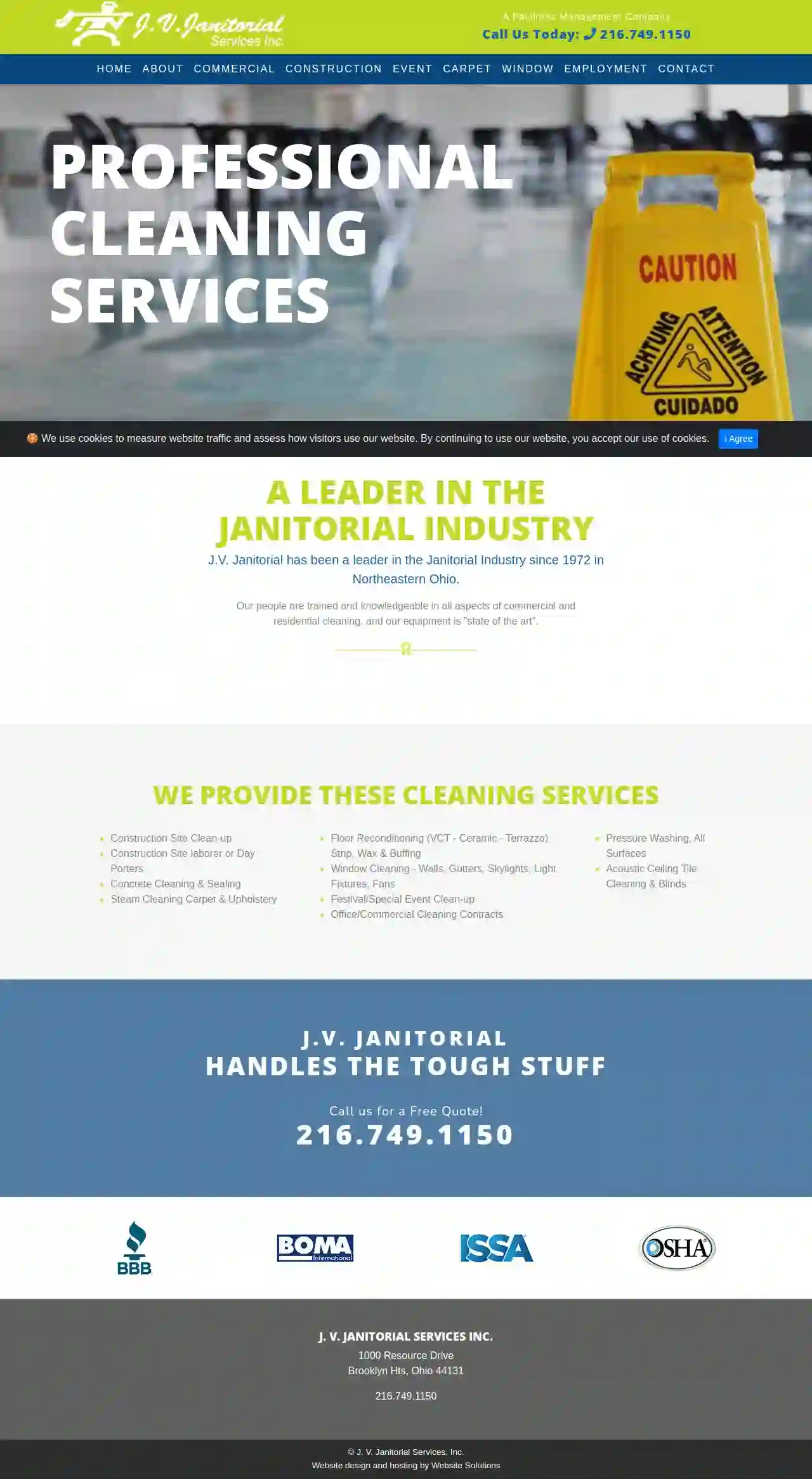Cleaning Services White House
Find Residential Cleaning in White House
Get multiple Cleaning quotes for your project today! Compare profiles, reviews, accreditations, portfolio, etc... and choose the best offer.

JSI Janitorial, LLC
3.5137 reviewsCuyahoga Heights, Ohio, 4830 East 49th Street, 44125, USJSI Janitorial is a family-owned and operated business that has been providing top-notch commercial janitorial services in Ohio since 1970. With a staff of nearly 1,000, we offer a wide range of services including daily and nightly cleaning, porter maintenance, hard surface floor care, carpet cleaning, operating room cleaning, construction clean up, pressure washing, and window washing. Our commitment to environmental sustainability and customer satisfaction sets us apart from other service providers. We have partnered with over 200 prestigious clients across various industries such as healthcare, automotive, food service, banking, commercial offices, retail, government, manufacturing, real estate, broadcasting, public service, schools, colleges, universities, special events, and sports complexes. Our mission is to efficiently deliver a broad spectrum of janitorial services to each of our clients on a nightly basis, promoting clean and safe buildings while fulfilling our commitment to environmental sustainability. We strive to incorporate the most innovative resources and technology to provide the most effective janitorial program available. Our vision is to maintain a superior workforce of professionals through continuing education, with a strong focus on leadership and teamwork. We embrace diversity amongst our clients, employees, and suppliers. Our pro-active approach to providing services emphasizes communication and responsiveness from all levels of personnel. We operate on the same core principles and values upon which we were founded, maintaining undeniable integrity and consistently delivering the highest level of service which our customers have come to expect over 50 years.
- Services
- Why Us?
- Accreditations
- Our Team
- Testimonials
- Gallery
Get Quote
J V Janitorial Services Inc
3.841 reviewsCleveland, US- Services
- Why Us?
- Gallery
Get Quote
CleanNet of Cleveland Inc.
2.86 reviewsCleveland, US- Services
- Why Us?
- Gallery
Get Quote
Jani-King of Cleveland: Janitorial Services
4.231 reviewsCleveland, US- Services
- Why Us?
Get Quote
Spotless Therapy Cleaning Services
4.98 reviewsNashville, US- Services
- Why Us?
Get Quote
Custom Clean
4.616 reviewsClarksville, US- Services
- Why Us?
Get Quote
Lathon's cleaning service
514 reviewsClarksville, US- Services
- Why Us?
Get Quote
Tennessee Trendy Cleaning Services
4.878 reviewsNashville, US- Services
- Why Us?
Get Quote- Cl
Cleaning Murfreesboro
4.418 reviewsMurfreesboro, US- Services
- Why Us?
Get Quote 
Magical Cleaning Services
51 reviewsClarksville, US- Services
- Why Us?
Get Quote
Over 60,241+ Cleaning Contractors onboarded
Our janitorial pros operate in White House & surroundings!
CleaningMatch has curated and vetted Top Cleaning Contractors arround White House. Find a reliable pro today.
Frequently Asked Questions About Cleaning Services
- Online Directories: Use online directories like CleaningMatch to search for cleaning services in your area. Filter your search results by the specific cleaning type you need.
- Search Engines: Use search engines like Google to find cleaning services specializing in your desired cleaning type. For example, search for 'post-construction cleaning services near me' or 'eco-friendly cleaning services in [city name].'
- Ask for Referrals: Ask friends, family, neighbors, or colleagues if they know of any reputable cleaning services specializing in your desired cleaning type.
- Check Company Websites: Visit the websites of cleaning services in your area to see if they list the specific cleaning type you need among their services.
- Contact Companies Directly: Contact cleaning companies directly to inquire about their specialization in your desired cleaning type.
- Check Fabric Care Label: Always check the upholstery care label for cleaning instructions specific to the fabric. Some fabrics may require professional cleaning.
- Vacuum: Vacuum the upholstery thoroughly to remove dust and loose debris. Use a brush attachment for crevices and seams.
- Spot Cleaning: For stains, blot with a clean cloth or sponge. Avoid rubbing, as it can spread the stain. Use a mild upholstery cleaner or a homemade solution of water and mild dish soap.
- Upholstery Cleaning Machine: If the fabric is suitable for wet cleaning, you can use an upholstery cleaning machine. Follow the machine's instructions carefully and test a small, hidden area first.
- Professional Upholstery Cleaning: For delicate fabrics, deep cleaning, or stubborn stains, consider hiring a professional upholstery cleaning service. They have specialized knowledge and equipment to clean upholstery safely and effectively.
- Dishes: Load the dishwasher or wash dishes by hand.
- Sink: Clean the sink with a sponge or cloth and dish soap. Pay attention to the faucet and drain. You can also use a baking soda paste to remove stubborn stains.
- Countertops: Wipe down countertops with a disinfectant cleaner or all-purpose cleaner.
- Stovetop: Clean the stovetop with a degreaser or stovetop cleaner. Remove burner grates and wash them separately if needed.
- Oven: Clean the oven according to the manufacturer's instructions. You can use a self-cleaning function or a commercial oven cleaner.
- Microwave: Clean the microwave interior with a damp cloth or sponge. For stuck-on food, heat a bowl of water with lemon juice in the microwave for a few minutes to loosen debris.
- Refrigerator: Wipe down the refrigerator shelves and drawers with a damp cloth or sponge. Remove any expired food and clean spills promptly.
- Floors: Sweep or vacuum the floor, then mop with a floor cleaner suitable for your kitchen floor type.
- Trash: Empty the trash can and recycling bin.
- Blot, don't rub: When treating fresh stains, blot with a clean cloth or paper towel to absorb as much of the stain as possible. Rubbing can spread the stain and damage carpet fibers.
- Club Soda: For spills like wine or coffee, pour club soda on the stain, let it fizz, then blot with a clean cloth. Repeat if needed.
- Vinegar Solution: Mix equal parts white vinegar and water, apply to the stain, and blot. Vinegar helps remove stains and odors.
- Baking Soda Paste: Make a paste with baking soda and water, apply to the stain, let it dry, then vacuum. Baking soda absorbs odors and lifts stains.
- Commercial Carpet Cleaner: : Use a commercial carpet cleaner according to the instructions. Choose a cleaner specifically designed for the type of stain you're dealing with.
- Professional Carpet Cleaning: For stubborn or deeply set stains, consider hiring a professional carpet cleaning service. They have specialized equipment and expertise in stain removal.
How do I find a cleaning service that specializes in [specific type of cleaning]?
By using these methods, you can find a qualified cleaning service that meets your specific cleaning needs.
How do I clean upholstery without damaging the fabric?
Always test any cleaning solution on a small, inconspicuous area first to avoid discoloration or damage.
What is the most efficient way to clean a kitchen?
Regularly cleaning your kitchen helps maintain a hygienic and organized space for cooking and dining.
How can I get rid of tough stains on carpets?
Always test any cleaning solution on a small, inconspicuous area of the carpet first to ensure it doesn't cause discoloration or damage.
How do I find a cleaning service that specializes in [specific type of cleaning]?
- Online Directories: Use online directories like CleaningMatch to search for cleaning services in your area. Filter your search results by the specific cleaning type you need.
- Search Engines: Use search engines like Google to find cleaning services specializing in your desired cleaning type. For example, search for 'post-construction cleaning services near me' or 'eco-friendly cleaning services in [city name].'
- Ask for Referrals: Ask friends, family, neighbors, or colleagues if they know of any reputable cleaning services specializing in your desired cleaning type.
- Check Company Websites: Visit the websites of cleaning services in your area to see if they list the specific cleaning type you need among their services.
- Contact Companies Directly: Contact cleaning companies directly to inquire about their specialization in your desired cleaning type.
By using these methods, you can find a qualified cleaning service that meets your specific cleaning needs.
How do I clean upholstery without damaging the fabric?
- Check Fabric Care Label: Always check the upholstery care label for cleaning instructions specific to the fabric. Some fabrics may require professional cleaning.
- Vacuum: Vacuum the upholstery thoroughly to remove dust and loose debris. Use a brush attachment for crevices and seams.
- Spot Cleaning: For stains, blot with a clean cloth or sponge. Avoid rubbing, as it can spread the stain. Use a mild upholstery cleaner or a homemade solution of water and mild dish soap.
- Upholstery Cleaning Machine: If the fabric is suitable for wet cleaning, you can use an upholstery cleaning machine. Follow the machine's instructions carefully and test a small, hidden area first.
- Professional Upholstery Cleaning: For delicate fabrics, deep cleaning, or stubborn stains, consider hiring a professional upholstery cleaning service. They have specialized knowledge and equipment to clean upholstery safely and effectively.
Always test any cleaning solution on a small, inconspicuous area first to avoid discoloration or damage.
What is the most efficient way to clean a kitchen?
- Dishes: Load the dishwasher or wash dishes by hand.
- Sink: Clean the sink with a sponge or cloth and dish soap. Pay attention to the faucet and drain. You can also use a baking soda paste to remove stubborn stains.
- Countertops: Wipe down countertops with a disinfectant cleaner or all-purpose cleaner.
- Stovetop: Clean the stovetop with a degreaser or stovetop cleaner. Remove burner grates and wash them separately if needed.
- Oven: Clean the oven according to the manufacturer's instructions. You can use a self-cleaning function or a commercial oven cleaner.
- Microwave: Clean the microwave interior with a damp cloth or sponge. For stuck-on food, heat a bowl of water with lemon juice in the microwave for a few minutes to loosen debris.
- Refrigerator: Wipe down the refrigerator shelves and drawers with a damp cloth or sponge. Remove any expired food and clean spills promptly.
- Floors: Sweep or vacuum the floor, then mop with a floor cleaner suitable for your kitchen floor type.
- Trash: Empty the trash can and recycling bin.
Regularly cleaning your kitchen helps maintain a hygienic and organized space for cooking and dining.
How can I get rid of tough stains on carpets?
- Blot, don't rub: When treating fresh stains, blot with a clean cloth or paper towel to absorb as much of the stain as possible. Rubbing can spread the stain and damage carpet fibers.
- Club Soda: For spills like wine or coffee, pour club soda on the stain, let it fizz, then blot with a clean cloth. Repeat if needed.
- Vinegar Solution: Mix equal parts white vinegar and water, apply to the stain, and blot. Vinegar helps remove stains and odors.
- Baking Soda Paste: Make a paste with baking soda and water, apply to the stain, let it dry, then vacuum. Baking soda absorbs odors and lifts stains.
- Commercial Carpet Cleaner: : Use a commercial carpet cleaner according to the instructions. Choose a cleaner specifically designed for the type of stain you're dealing with.
- Professional Carpet Cleaning: For stubborn or deeply set stains, consider hiring a professional carpet cleaning service. They have specialized equipment and expertise in stain removal.
Always test any cleaning solution on a small, inconspicuous area of the carpet first to ensure it doesn't cause discoloration or damage.